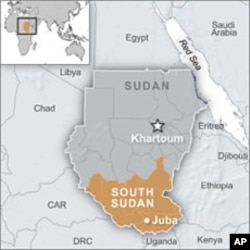The World Health Organization reports it is very close to eradicating guinea worm, a crippling parasitic disease. WHO says it needs $350 million to finish the job of ridding the world of this ancient, dreaded disease.
Campaigners for the global eradication of guinea worm hope to succeed in their efforts to make the disease only the second one, after smallpox, to be completely wiped off the face of the Earth. A global polio eradication campaign also is currently underway.
The Coordinator of the Department of Neglected Tropical Diseases at the World Health Organization, Dirk Engels, says the goal of eradication is in sight.
“When the campaign officially started at the end of the 1980s, there was still a few million cases, 3.5 million to be more accurate. And, today, this year, up to now, there are only less than 1,000 cases left in four countries. Most of them in the new Republic of South Sudan,” said Dr. Engels.
Ninety-seven percent of cases of guinea worm are in South Sudan. The remaining three percent are to be found in Chad, Ethiopia and Mali.
Guinea worm is a dreadful disease. People get it by swallowing infected water fleas when drinking contaminated water. The larvae from these infected water fleas grow to be one meter long. They are usually housed in the legs, causing great disability. The worm takes about one year to work its way out of the body.
There is no vaccine to prevent nor is there any medication to treat the disease. But, prevention is possible. Dr. Engels warns countries free of guinea worm must not become complacent. Hesays people must remain vigilant because the disease can easily and quickly be re-introduced.
“I can give you the example of one case of a person in northern Mali, a pilgrim who was walking towards Algeria and was affected by the disease. He stopped in a village, contaminated a water body and that has so far generated 400 cases in the next five years. That is how fast it can go,” said Dr. Engels.
Dr. Engels says the key to success in preventing and eradicating guinea worm includes very close and accurate community-based surveillance, spotting cases very early, bandaging wounds and picking up the worm before it can actually reach the water.
He says it is critical for people who have the disease to not go into the water, and for safe drinking water to be available to all communities.




